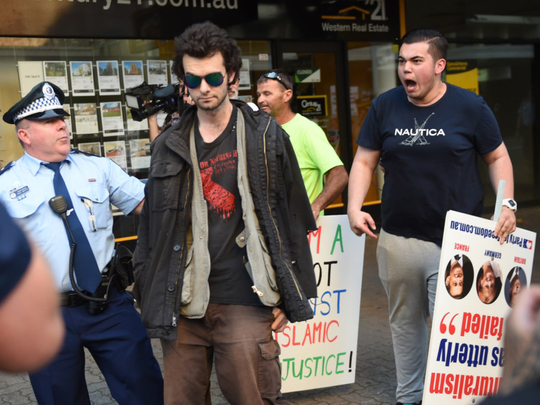
As Australians we typically think of ourselves as relaxed and welcoming people. So it has been sad to see so many police deployed in Bendigo and Parramatta during the past week or so. It’s not often that we need police out in force to keep the peace.
Thankfully, anti-Muslim protests have not led to any major or serious violence. Police managed to prevent the clashes with anti-racism protestors that have occurred in the past.
Amid current concerns about extremism, it can be tempting to conclude that the anti-Muslim protests in Bendigo and Parramatta are signs of fracturing in our society. For obvious reasons, protests attract significant media attention.
Yet we should also keep our perspective. For the most part, fringe groups have driven these anti-Muslim protests. Far-right extremist groups have become more vocal in their activities. In the case of Bendigo, for example, they have conducted an extended campaign of bullying and intimidation. However, Australian society is widely accepted as a multicultural one. Most of us believe that people should have the freedom to express their traditions and practise their religion. That everyone should be entitled to such freedom within the limits of the law.
This isn’t to deny some challenges. The recent murder of NSW Police employee Curtis Cheng by 15-year-old Farhad Jabar was shocking in its brutality. Along with last year’s incident involving Abdul Numan Haider in Melbourne, it reminds us there are young people who are susceptible to being seduced by messengers of violence. There is a small minority of people who use the Islamic faith to justify acts of terrorism.
The vast majority of Muslims in Australia find such a proposition abhorrent. The communities I have worked with have spoken out against violent extremism. Let’s condemn extremism - but let’s not judge entire communities based on the extremism of a few. Our public debate has recently shifted in one important respect. It was timely last week that the prime minister, Malcolm Turnbull, spoke about the importance of mutual respect in a multicultural society.
This is an improvement in the tone of political leadership. It counters some of the deterioration in public debate that has been produced by rabble-rousing extremist fringes. And it represents where mainstream public opinion is in fact located. Anti-Muslim campaigners will no doubt feel encouraged by the upcoming visit of Geert Wilders, the controversial Dutch politician. Wilders is expected next week to launch a new political party which argues against the so-called “Islamisation” of Australia. Some Muslim community groups argue that he should be denied a visa.
We know from experience that our multicultural society is robust enough to repudiate hatred and intolerance.
The government should give careful consideration of the public interest, as it has in the past in granting visas to controversial public figures. Based on what we know, though, a ban on Geert Wilders may not be warranted. We know from experience that our multicultural society is robust enough to repudiate hatred and intolerance.
High social mobility
If Wilders is to visit, he should know that he may be held to account for anything that vilifies people, or incites hatred or violence. We value freedom of speech but we also value freedom from discrimination. People are accountable under our laws for the consequences of what they say or do. In many ways, we can respond to extremism from a position of strength. Not many societies have managed to be as cohesive as ours, while being so diverse. Few have managed to accept such large numbers of immigrants without experiencing fragmentation.
Compare our record of immigration with countries in Europe, where race riots and social unrest are frequent occurrences. It is a marked difference here that the vast majority of migrants to Australia become citizens rather than remaining as guest workers or permanent foreigners.
Migrants to Australia also enjoy relatively high social mobility. The children of migrants aren’t shut out from opportunity, but on average outperform the children of native-born Australians. It’s a sign of successful integration that many second-generation Australians speak with a broad Australian twang. On the whole, ours is a happy story, though we don’t always realise it. There is something revealing in how the majority of Australians endorse multiculturalism and mass immigration. Last year’s Scanlon Foundation survey on social cohesion, for example, found that 85% of respondents agreed that multiculturalism is good for the country. It also found that 58% of respondents agreed that the immigration intake is about right or too low. These wouldn’t be figures you’d find in Europe. All this reflects how Australian multiculturalism has a distinctive character. It has been about nation-building. It hasn’t been about rejecting an Australian identity, but rather ensuring that everyone can be Australian regardless of their race or ancestry. Whether you’re Bruce, Tran or Mohammed, you can be an Australian if you’re prepared to be part of our democratic society. With community harmony more important than ever, now isn’t the time to be talking down our multicultural success. It’s time for all good citizens to say that we choose tolerance and unity over bigotry and division.
— Guardian News & Media Ltd
Tim Soutphommasane is the Australian race discrimination commissioner.










